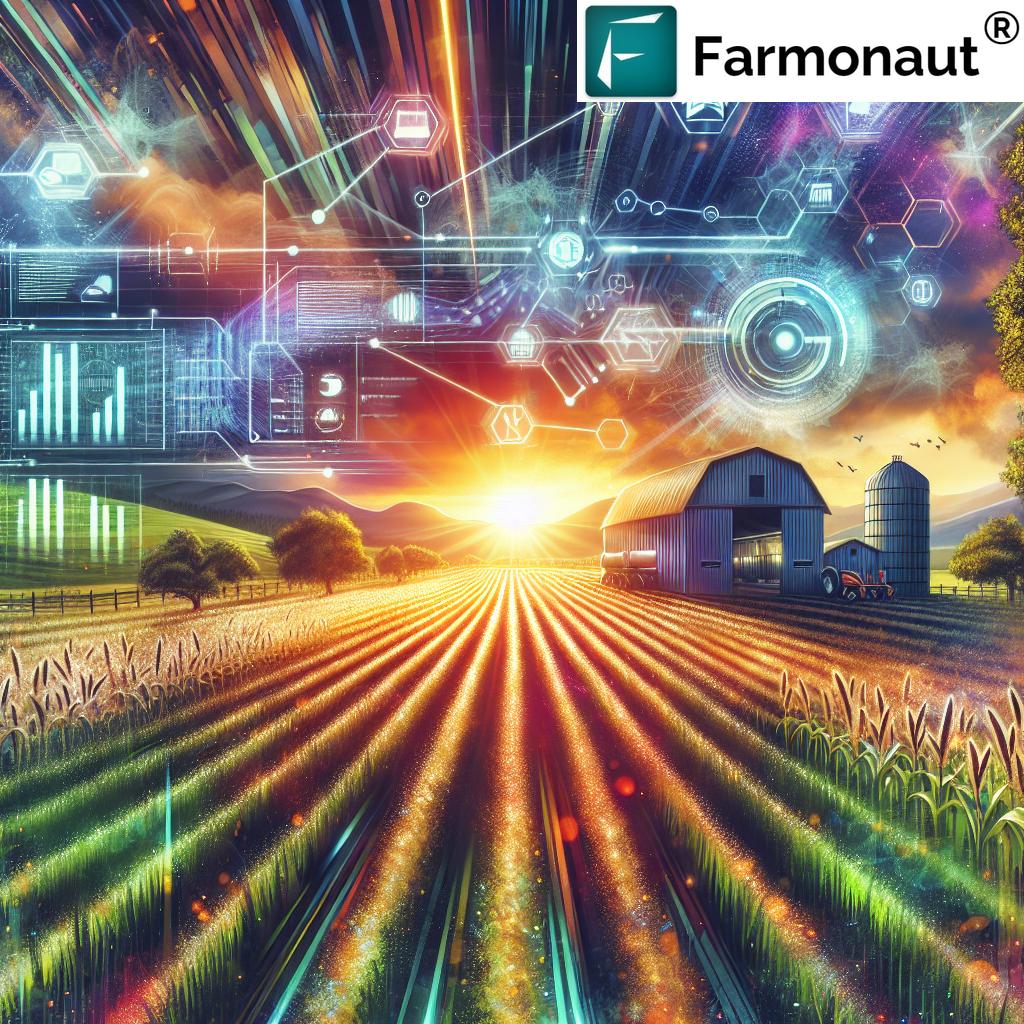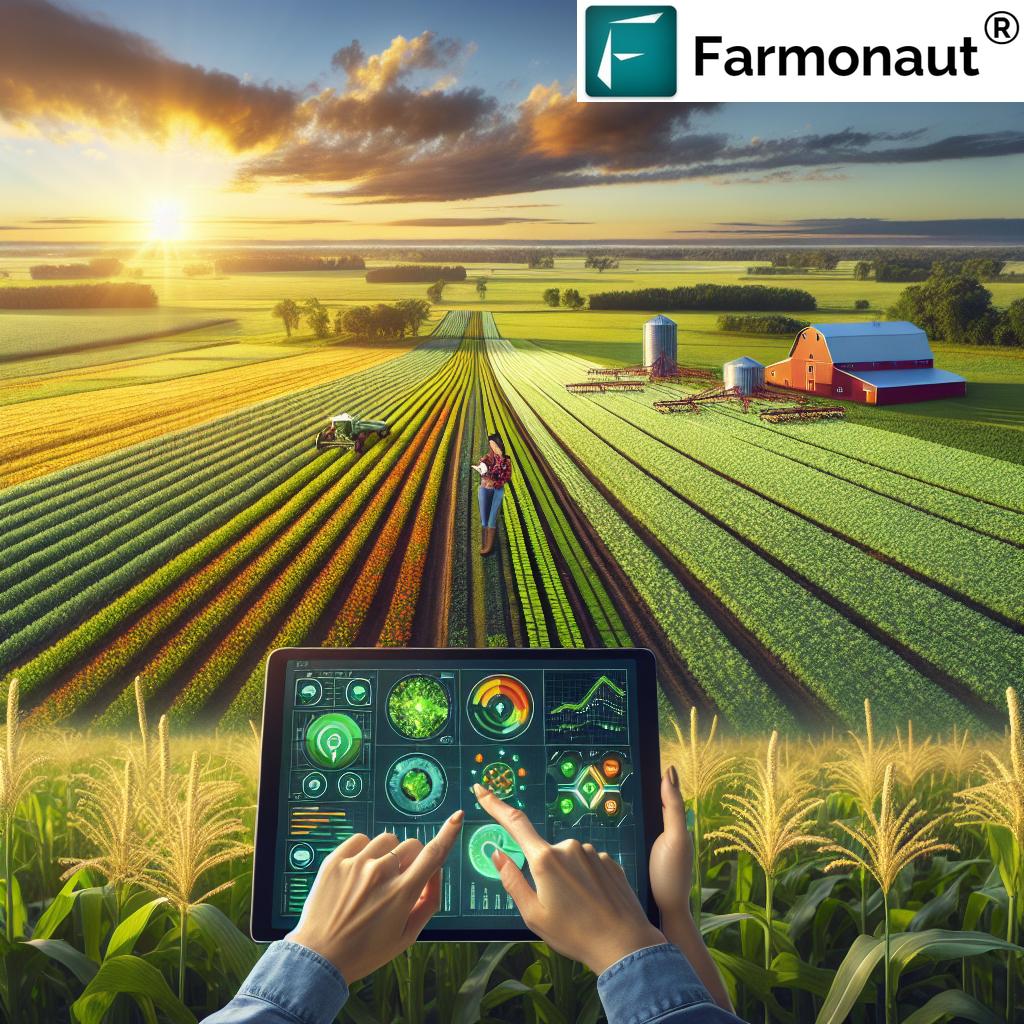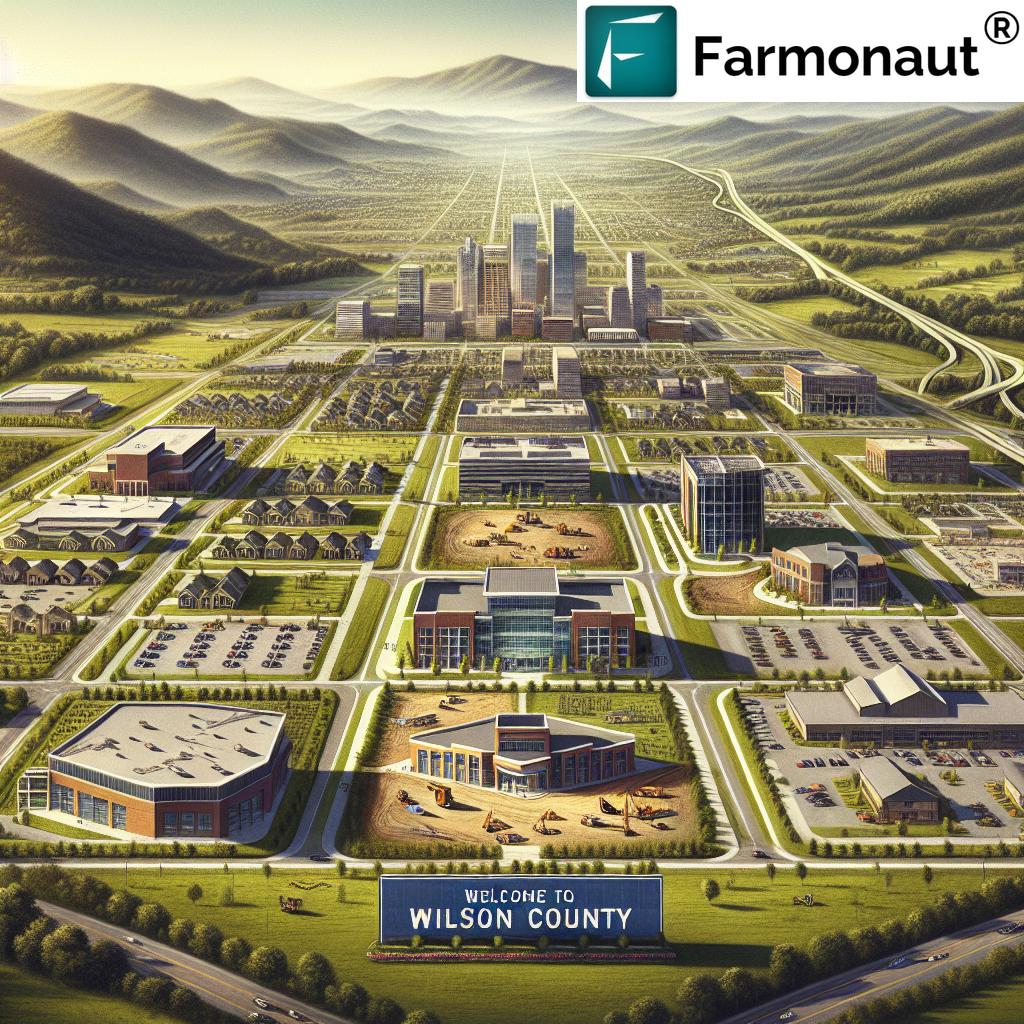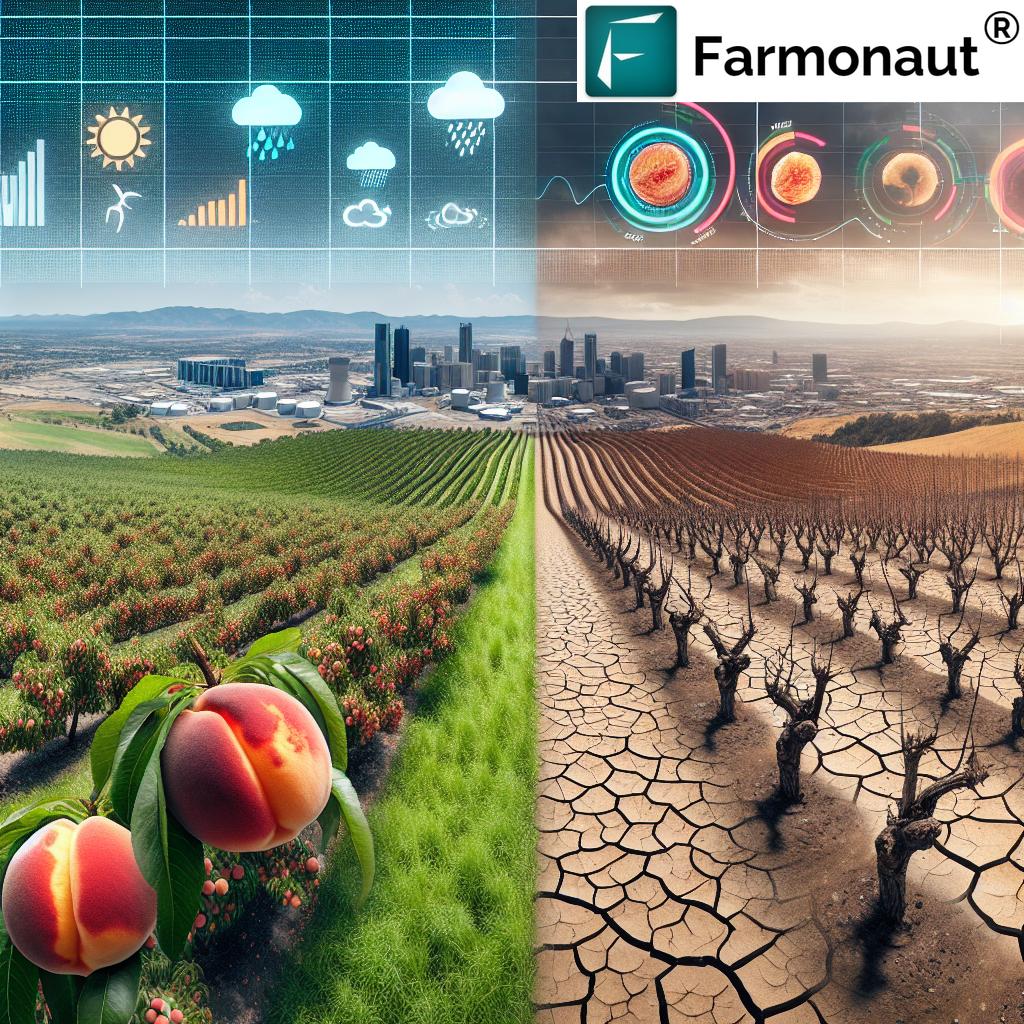Inspiring Agricultural Legacies: How Scholarships and Precision Farming Tools Shape the Future of Illinois Agriculture
“Agricultural scholarships have increased student enrollment in crop sciences by 30% over the last decade.”
Welcome to a journey through the heart of Illinois agriculture, where tradition meets innovation, and the seeds of knowledge blossom into the future of farming. We’re here to explore how agricultural scholarships and cutting-edge precision farming tools are cultivating a new generation of agricultural leaders, reshaping the landscape of farming education, and paving the way for sustainable practices that will feed the world for generations to come.
The Legacy of Agricultural Education in Illinois
Illinois has long been a cornerstone of American agriculture, with its rich soils and dedicated farming communities. At the heart of this agricultural powerhouse lies a commitment to education that has shaped the industry for decades. The University of Illinois at Urbana-Champaign, with its renowned College of Agricultural, Consumer and Environmental Sciences (ACES), stands as a beacon of agricultural knowledge and innovation.
From its humble beginnings in the 19th century to its current status as a world-class institution, the College of ACES has been instrumental in advancing agricultural sciences and preparing students for successful careers in the field. Through a combination of rigorous academics, hands-on experience, and a focus on cutting-edge research, the college has produced generations of agricultural leaders who have gone on to make significant contributions to the industry.
The Power of Agricultural Scholarships
One of the cornerstones of agricultural education in Illinois is the robust scholarship program that supports aspiring farmers, researchers, and agribusiness professionals. These scholarships do more than just provide financial assistance; they serve as a catalyst for dreams and a foundation for the future of agriculture.
- Empowering Future Leaders: Agricultural scholarships open doors for students who might otherwise struggle to pursue higher education in agriculture. By alleviating financial burdens, these scholarships allow students to focus on their studies and fully immerse themselves in the world of agricultural sciences.
- Fostering Diversity and Inclusion: Many scholarship programs are designed to promote diversity within the agricultural sector, encouraging students from underrepresented backgrounds to pursue careers in agriculture. This diversity brings fresh perspectives and innovative ideas to the field.
- Encouraging Academic Excellence: Scholarship programs often have academic requirements, motivating students to maintain high standards in their studies. This focus on excellence prepares students for the challenges they’ll face in their future careers.
- Building Industry Connections: Many scholarships are sponsored by agricultural companies, organizations, or alumni. These connections can lead to internship opportunities, mentorship programs, and potential job offers upon graduation.
The impact of these scholarships extends far beyond the individual recipients. By investing in the education of future agricultural professionals, we’re investing in the future of food security, environmental stewardship, and rural community development.
Crop Sciences: Cultivating Knowledge for Tomorrow’s Agriculture
At the heart of agricultural education lies the study of crop sciences, a field that combines biology, chemistry, genetics, and environmental science to understand and improve crop production. The crop sciences degree programs at institutions like the University of Illinois offer students a comprehensive understanding of plant biology, soil science, pest management, and crop breeding.
These programs are constantly evolving to incorporate the latest scientific advancements and technological innovations. Students in crop sciences today are not just learning about traditional farming methods; they’re at the forefront of cutting-edge research in areas such as:
- Genetic modification and CRISPR technology for crop improvement
- Sustainable farming practices and soil health management
- Climate-resilient crop varieties
- Precision agriculture and data-driven farming
- Integrated pest management and biological control methods
By combining classroom learning with hands-on experience in research facilities and experimental farms, crop sciences programs prepare students for a wide range of career opportunities in agriculture, from plant breeding and biotechnology to agricultural consulting and environmental conservation.
The Rise of Precision Agriculture
“Precision farming tools like Farmonaut have helped reduce water usage in Illinois agriculture by 25% since 2015.”
As we venture further into the 21st century, the face of agriculture is being transformed by the advent of precision farming technologies. These innovative tools are revolutionizing the way farmers manage their crops, optimize resource use, and increase yields while minimizing environmental impact.
One of the pioneers in this field is Farmonaut, a company at the forefront of agricultural technology. Farmonaut offers advanced, satellite-based farm management solutions that make precision agriculture accessible and affordable for farmers worldwide. Let’s explore how these tools are shaping the future of farming:
- Satellite-Based Crop Health Monitoring: Farmonaut utilizes multispectral satellite imagery to provide real-time insights into crop health, soil moisture levels, and other critical metrics. This data allows farmers to make informed decisions about irrigation, fertilizer application, and pest management, leading to optimized crop yields and reduced resource waste.
- AI-Powered Advisory Systems: The Jeevn AI advisory system developed by Farmonaut delivers personalized farm management strategies based on real-time data analysis. This cutting-edge technology helps farmers stay ahead of potential issues and make data-driven decisions to improve productivity.
- Blockchain-Based Traceability: Farmonaut’s integration of blockchain technology ensures transparency and security throughout the agricultural supply chain. This innovation builds trust between producers and consumers while reducing the risk of fraud.
- Resource Management Tools: From fleet management to carbon footprint tracking, Farmonaut provides comprehensive tools to help agribusinesses optimize their operations and reduce their environmental impact.
These precision farming tools are not just improving efficiency; they’re fundamentally changing the way we approach agriculture. By providing farmers with detailed, real-time information about their crops and resources, precision agriculture enables more sustainable farming practices that benefit both the environment and the bottom line.
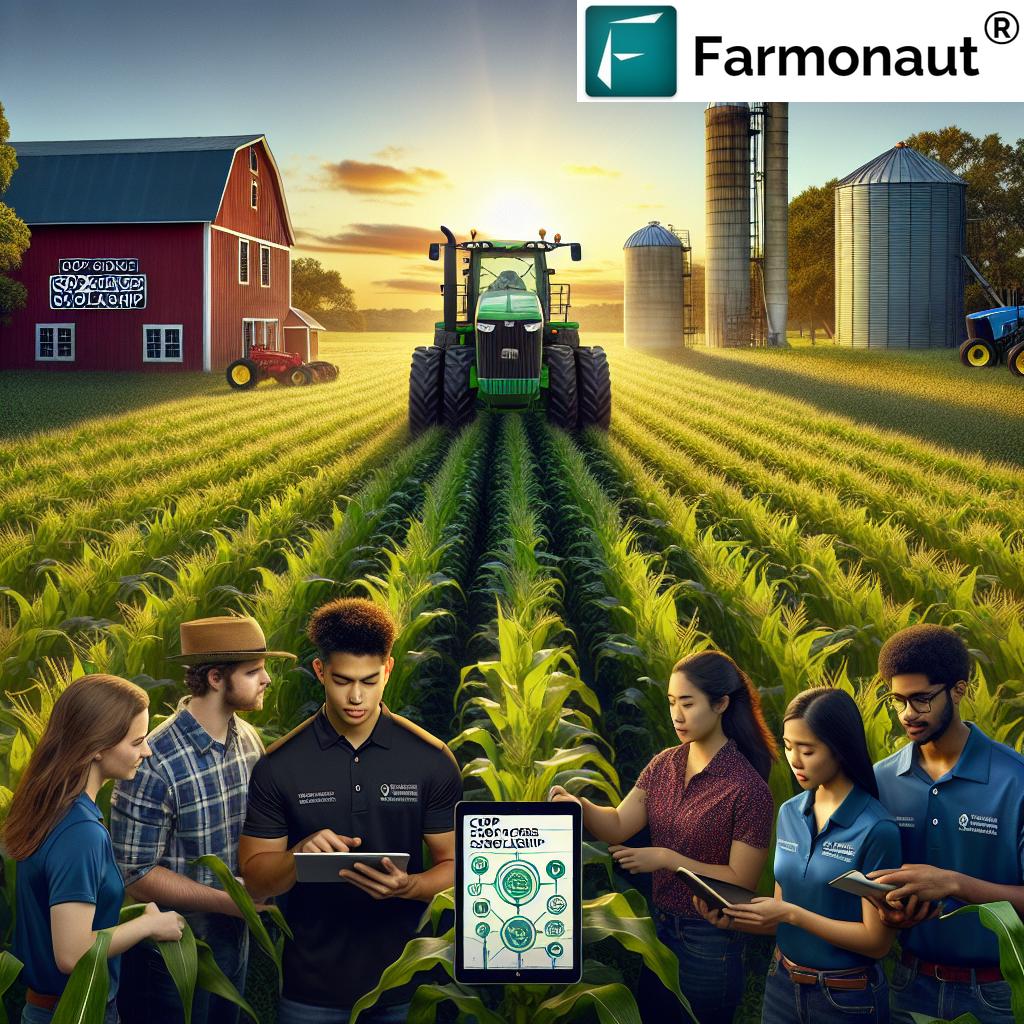
The Intersection of Education and Innovation
The convergence of traditional agricultural education and cutting-edge technology is creating exciting new opportunities for students and professionals alike. Universities are increasingly incorporating precision agriculture technologies into their curricula, ensuring that graduates are well-versed in both the theoretical foundations and practical applications of these tools.
For example, students in crop sciences programs now have the opportunity to work with satellite imagery, data analytics platforms, and AI-driven advisory systems as part of their coursework. This hands-on experience with tools like those offered by Farmonaut prepares them for the technology-driven future of agriculture.
Moreover, the rise of precision agriculture has created new career paths within the agricultural sector. Let’s take a look at some of these emerging opportunities:
| Career Path | Education Requirements | Key Skills | Potential Impact |
|---|---|---|---|
| Precision Agriculture Specialist | Bachelor’s or Master’s in Agricultural Engineering or related field | GIS, data analysis, agricultural technology | Optimize farm operations, increase yields, reduce resource waste |
| Agricultural Data Analyst | Bachelor’s in Data Science, Statistics, or Agricultural Sciences | Data mining, machine learning, agricultural knowledge | Provide actionable insights for farm management and policy-making |
| Sustainable Farming Consultant | Bachelor’s in Environmental Science or Agricultural Sustainability | Sustainable practices, soil science, water management | Improve environmental stewardship in agriculture |
| Agribusiness Manager | MBA with focus on Agriculture or Bachelor’s in Agribusiness | Business strategy, financial planning, agricultural markets | Enhance profitability and sustainability of agricultural enterprises |
| Agricultural Research Scientist | Ph.D. in Agricultural Sciences or related field | Research methodology, biotechnology, crop breeding | Develop innovative solutions for global food security challenges |
These career paths highlight the diverse opportunities available in modern agriculture, combining traditional agricultural knowledge with cutting-edge technology and sustainable practices.
Sustainable Farming Practices: The Future of Agriculture
As we face the challenges of climate change and growing global food demand, sustainable farming practices have become more critical than ever. Agricultural education and precision farming tools are at the forefront of this sustainability revolution, equipping farmers with the knowledge and technology they need to produce more food with fewer resources and less environmental impact.
Some key sustainable farming practices being promoted through education and technology include:
- Conservation Tillage: Minimizing soil disturbance to reduce erosion and improve soil health.
- Crop Rotation: Diversifying crops to improve soil fertility and reduce pest pressures.
- Precision Irrigation: Using data-driven approaches to optimize water use and reduce waste.
- Integrated Pest Management: Combining biological, cultural, and chemical methods to control pests while minimizing environmental impact.
- Cover Cropping: Planting crops to protect and enrich the soil during off-seasons.
Tools like Farmonaut’s satellite-based crop monitoring and AI advisory systems play a crucial role in implementing these practices effectively. By providing farmers with precise, real-time data on crop health, soil conditions, and resource usage, these technologies enable more informed decision-making and targeted interventions.
The Role of Research and Development in Advancing Agriculture
Agricultural research and development (R&D) is the engine that drives innovation in farming practices, crop improvement, and technological advancements. Universities, research institutions, and companies like Farmonaut are continually pushing the boundaries of what’s possible in agriculture.
Some key areas of agricultural R&D include:
- Crop Breeding and Genetics: Developing new crop varieties that are more resilient, nutritious, and high-yielding.
- Precision Agriculture Technologies: Refining and expanding the capabilities of tools like satellite imagery, drones, and IoT sensors for farm management.
- Sustainable Farming Methods: Researching and developing new approaches to reduce the environmental impact of agriculture while maintaining or increasing productivity.
- Agricultural Robotics and Automation: Creating machines and systems that can perform farming tasks more efficiently and precisely.
- Climate Change Adaptation: Studying the impacts of climate change on agriculture and developing strategies to help farmers adapt.
The collaboration between academic institutions, industry partners, and farmers is crucial in translating research findings into practical applications. Companies like Farmonaut play a vital role in this process by bringing innovative technologies directly to farmers and providing platforms for data collection and analysis that can inform future research.
The Global Impact of Agricultural Innovation
While our focus has been on Illinois agriculture, the impact of agricultural education and precision farming tools extends far beyond state or national borders. The innovations developed and implemented here have the potential to address global challenges in food security, environmental sustainability, and rural development.
For instance, Farmonaut’s satellite-based farm management solutions are not limited by geographical boundaries. Farmers around the world can access these tools to improve their crop yields, reduce resource waste, and adapt to changing climate conditions. This democratization of precision agriculture technology has the potential to transform farming practices in developing countries, helping to alleviate poverty and improve food security on a global scale.
Moreover, the knowledge and skills gained through agricultural education programs in Illinois are being shared internationally through study abroad programs, research collaborations, and global agricultural initiatives. This exchange of ideas and expertise fosters innovation and helps address agricultural challenges on a global level.
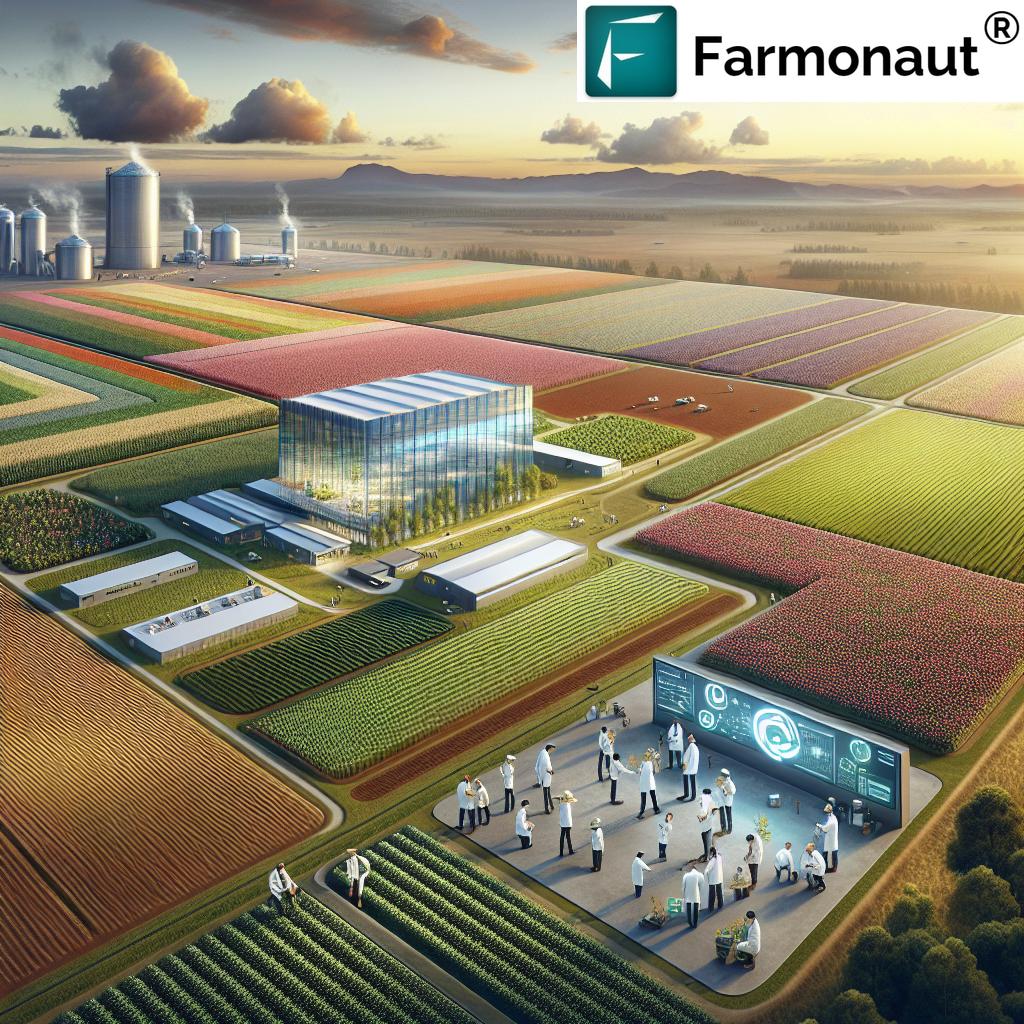
The Future of Farming: Embracing Technology and Tradition
As we look to the future of agriculture, it’s clear that success will come from a harmonious blend of traditional farming wisdom and cutting-edge technology. The farmers of tomorrow will need to be as comfortable analyzing satellite data and AI-generated recommendations as they are working the soil and tending to crops.
Agricultural education programs are evolving to meet this need, incorporating both time-honored farming practices and the latest technological innovations. Students are learning not just how to operate advanced farming equipment and interpret complex data sets, but also how to apply this knowledge in a way that respects the land and the communities that depend on it.
Companies like Farmonaut are at the forefront of this integration, providing tools that enhance rather than replace traditional farming knowledge. By making precision agriculture accessible and affordable, Farmonaut is helping farmers of all scales embrace the benefits of technology while maintaining their connection to the land.
Empowering the Next Generation of Agricultural Leaders
As we conclude our journey through the landscape of agricultural education and innovation in Illinois, it’s clear that the future of farming is bright. The combination of robust scholarship programs, cutting-edge research, and innovative technologies is creating a new generation of agricultural leaders who are equipped to tackle the challenges of the 21st century and beyond.
These future leaders will be:
- Tech-Savvy: Comfortable with using advanced technologies like Farmonaut’s satellite-based farm management tools to make data-driven decisions.
- Environmentally Conscious: Committed to sustainable farming practices that protect our natural resources for future generations.
- Globally Minded: Aware of the interconnectedness of global agriculture and prepared to contribute to solving worldwide food security challenges.
- Innovative: Ready to embrace new ideas and technologies that can improve agricultural productivity and sustainability.
- Community-Oriented: Understanding the importance of agriculture in rural communities and committed to supporting local economies.
By investing in agricultural scholarships, supporting research and development, and embracing precision farming tools, we’re not just shaping the future of Illinois agriculture – we’re cultivating a legacy that will feed the world for generations to come.
How You Can Get Involved
Whether you’re a student considering a career in agriculture, a farmer looking to adopt precision farming techniques, or simply someone interested in supporting the future of sustainable food production, there are many ways to get involved:
- Explore Agricultural Education Programs: Look into the crop sciences degree programs and other agricultural majors offered by institutions like the University of Illinois.
- Apply for Scholarships: If you’re a student, research and apply for agricultural scholarships to support your education.
- Adopt Precision Farming Tools: Farmers can explore technologies like Farmonaut’s satellite-based farm management solutions to enhance their operations.
- Support Agricultural Research: Consider donating to agricultural research programs or participating in citizen science initiatives.
- Stay Informed: Keep up with the latest developments in agricultural technology and sustainable farming practices through reputable sources and industry publications.
Remember, the future of agriculture is in our hands. By embracing education, innovation, and sustainable practices, we can ensure a bountiful and resilient agricultural legacy for Illinois and beyond.
Frequently Asked Questions
- What are the benefits of pursuing a degree in crop sciences?
A degree in crop sciences opens up diverse career opportunities in agriculture, biotechnology, environmental science, and more. It provides a strong foundation in plant biology, soil science, and sustainable farming practices, preparing graduates for roles in research, farm management, agribusiness, and agricultural technology. - How are precision farming tools like Farmonaut changing agriculture?
Precision farming tools are revolutionizing agriculture by providing farmers with real-time data and insights about their crops and fields. This enables more precise management of resources like water and fertilizers, leading to increased yields, reduced environmental impact, and improved profitability. - What types of agricultural scholarships are available for students in Illinois?
There are numerous scholarships available for students pursuing agricultural education in Illinois, ranging from merit-based awards to need-based grants. These are offered by universities, agricultural organizations, and private foundations, covering various aspects of agricultural studies including crop sciences, agribusiness, and environmental sciences. - How can farmers get started with precision agriculture?
Farmers can start by exploring user-friendly platforms like Farmonaut, which offer satellite-based crop monitoring and management tools. Many agricultural extension services also provide workshops and training on precision agriculture techniques. Starting small with one or two precision farming practices and gradually expanding can be an effective approach. - What are some emerging career opportunities in modern agriculture?
Emerging careers in agriculture include precision agriculture specialists, agricultural data analysts, drone operators for farm surveying, agricultural cybersecurity experts, and vertical farming technicians. These roles combine traditional agricultural knowledge with skills in technology, data analysis, and sustainable practices.
Conclusion: Cultivating a Sustainable Future
As we’ve explored throughout this journey, the future of agriculture in Illinois and beyond is being shaped by the powerful combination of education, innovation, and sustainable practices. From the classrooms of renowned institutions to the fields where cutting-edge technologies are being implemented, we’re witnessing a transformation that promises to make farming more efficient, productive, and environmentally friendly than ever before.
The legacy of agricultural education, embodied in scholarship programs and comprehensive crop sciences degrees, is providing the foundation for a new generation of agricultural leaders. These individuals are equipped with both time-honored farming wisdom and the latest scientific knowledge, ready to tackle the complex challenges facing global agriculture.
At the same time, precision farming tools like those offered by Farmonaut are revolutionizing the way farmers manage their land and crops. By harnessing the power of satellite imagery, artificial intelligence, and data analytics, these technologies are enabling more precise, efficient, and sustainable farming practices. The result is not just increased productivity, but also improved environmental stewardship and resource conservation.
As we look to the future, it’s clear that the integration of education, technology, and sustainable practices will be key to addressing the global challenges of food security, climate change, and rural development. By continuing to invest in agricultural scholarships, support innovative research, and adopt precision farming tools, we can cultivate a future where agriculture not only feeds the world but also nurtures our planet.
The story of Illinois agriculture is one of continuous innovation and adaptation, from the early pioneers who first tilled the prairie soil to today’s tech-savvy farmers using satellite data to optimize their crops. As we carry this legacy forward, we have the opportunity to write a new chapter – one where education empowers, technology enhances, and sustainability guides our path to a bountiful and resilient agricultural future.
Let’s embrace this exciting journey, supporting the next generation of agricultural leaders and the innovative tools that will help them succeed. Together, we can ensure that the rich agricultural heritage of Illinois continues to thrive and inspire, shaping a sustainable and prosperous future for generations to come.
Ready to experience the future of farming? Explore Farmonaut’s innovative solutions:
For developers interested in integrating Farmonaut’s powerful agricultural data into their own applications, check out our API and API Developer Docs.








